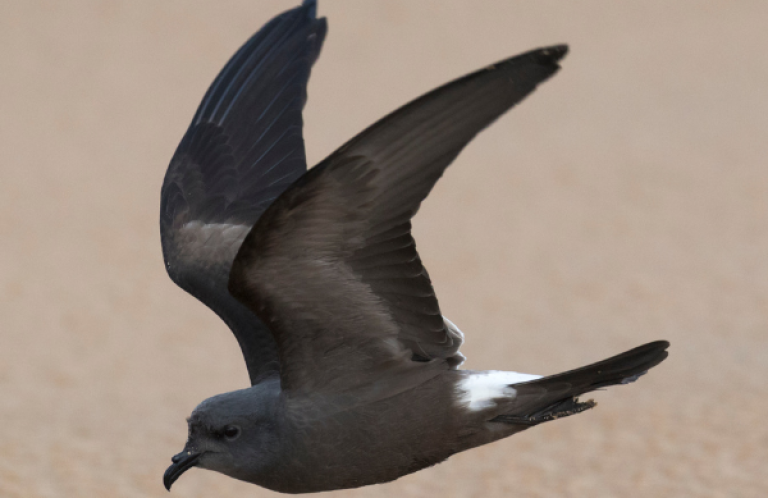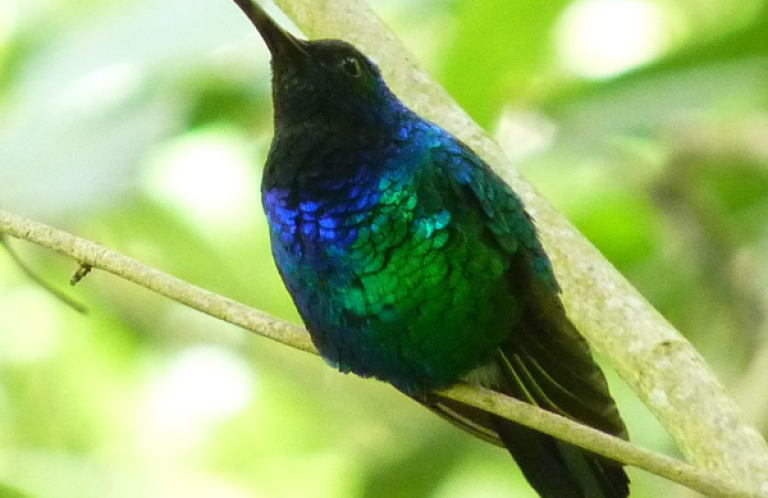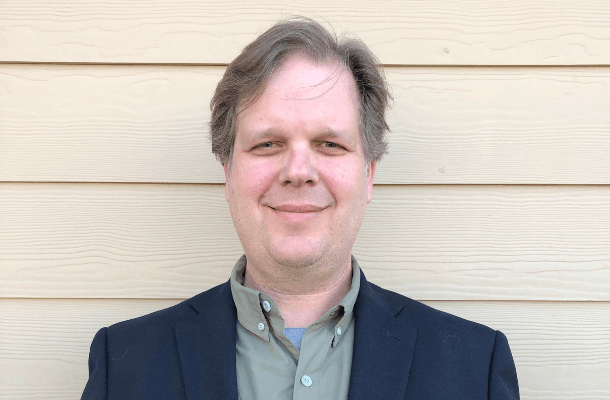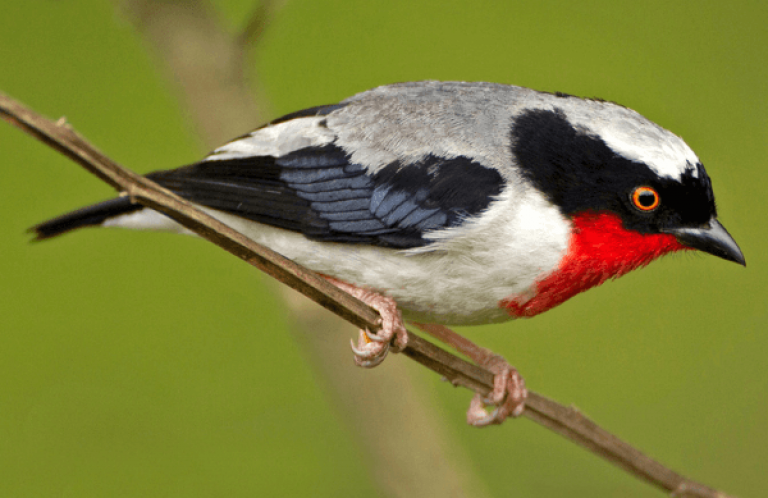Rare Parakeets Benefit From Reserve Expansion
Contact: Jennifer Howard, Director of Public Relations, 202-888-7472
Media: Photos of El Oro Parakeet and other species found at the reserve are available here.
(Washington, D.C., May 2, 2017) In good news for several globally threatened bird species including El Oro Parakeet, the nonprofit conservation group Fundación Jocotoco, with the support of American Bird Conservancy (ABC), Global Wildlife Conservation (GWC), World Land Trust (WLT), and other donors, has secured critical habitat and expanded its Buenaventura Reserve in Ecuador.
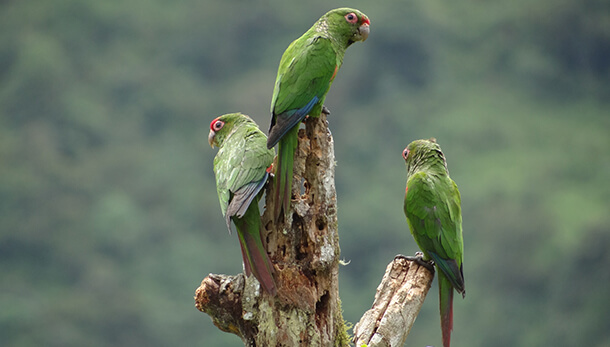
Rare El Oro Parakeets will benefit from the reserve expansion, along with many other species. Photo by Francisco Sornoza
The reserve is the sole protected area for the Endangered El Oro Parakeet, which numbers fewer than 1,000 individuals and is found only on the western slope of the Andes in southwestern Ecuador. The area also provides wintering habitat for migratory birds that nest in North America, such as Blackburnian Warbler.
In the first quarter of 2017, the partners purchased two tracts of critical habitat to add to the existing reserve. The first parcel, totaling 68 acres, was acquired in January 2017. The second site—a private inholding of 31 acres located within the boundary of the reserve—was purchased in March 2017. Acquiring this second tract not only protects access to the central part of the reserve, it preserves an important foraging area for the Endangered Gray-breasted Hawk.
“I am very grateful that ABC, GWC, and WLT assisted Fundación Jocotoco in purchasing critical habitat to expand Buenaventura,” said Martin Schaefer, Jocotoco's Executive Director. “This reserve protects a unique mix of semi-humid to very wet montane forest and is the only protected area in this region for 15 globally threatened bird species, including the El Oro Parakeet, Long-wattled Umbrellabird, Pacific Royal Flycatcher, and the very rare El Oro Tapaculo.”
Both Global Wildlife Conservation and GWC partner Australian Reptile Park provided financial support for this project, in part to help offset carbon emissions from Australian Reptile Park owner John Weigel's North American Big Year. At 783 bird species, Weigel broke the record for most birds found in North America in a single year in 2016. His adventures took him across North America, from the remote Attu Island in Alaska to the southern tip of Florida.
“Although a primary goal of my Big Year was to raise awareness for the plight of the Tasmanian devil and Australia's other imperilled wildlife, it was important to me that I look to the Americas when offsetting my Big Year's carbon footprint,” Weigel said. “I wanted Australian Reptile Park to support a project that benefited some of the migratory birds that I enjoyed during my quest in North America.”
In spite of its eye-catching colors, the El Oro Parakeet managed to elude discovery for many years. The species was first discovered in 1980 and only officially described in 1988. Threats to these birds include habitat loss and fragmentation. Many suitable nesting trees are harvested for building materials and cut down to create cattle-grazing pasture, a practice that has been shown to limit parakeet populations.
Conservation efforts on the parakeet's behalf at Buenaventura are producing results. The just-concluded breeding season produced at least 55 El Oro Parakeet fledglings from 22 artificial nest boxes installed at the reserve.
“Protecting this habitat is clearly having a direct impact on the survival of this special bird,” said Wes Sechrest, GWC Chief Scientist and CEO. “We're thrilled to play a role not only in the recovery of the El Oro parakeet, but also in the protection of all of the wildlife species that call Buenaventura home.”
As well as its rare birds, Buenaventura harbors several recently described amphibian species currently known only from sightings at the reserve. “One frog species new to science occurs on the reserve's southern ridge, in an area that is now better protected thanks to this purchase,” Schaefer said.
In addition to helping wildlife, the reserve attracts birdwatching tourists to the region, generating income for local businesses and communities.
The expansion of the reserve was made possible by the generous support of Global Wildlife Conservation, Australian Reptile Park, World Land Trust, The Robert W. Wilson Charitable Trust, Diane and Richard Huxtable, The Mohamed bin Zayed Species Conservation Fund, and April and Mark Sapsford, as well as a number of individual donors.
In addition to Buenaventura, ABC is working throughout our network of 70 reserves to preserve critical habitat and achieve conservation results for birds. Learn more.
###
American Bird Conservancy is dedicated to conserving birds and their habitats throughout the Americas. With an emphasis on achieving results and working in partnership, we take on the greatest problems facing birds today, innovating and building on rapid advancements in science to halt extinctions, protect habitats, eliminate threats, and build capacity for bird conservation.
Fundación Jocotoco is an Ecuadorian nongovernmental organization established in 1998 to protect land of critical importance to the conservation of Ecuador's endangered birds and associated biodiversity. Jocotoco primarily achieves this by purchasing lands and managing them as ecological reserves.
Austin-based Global Wildlife Conservation envisions a thriving Earth where all life flourishes. GWC conserves the diversity of life on Earth by preserving wildlands, restoring wildlife and engaging with global guardians. Driven by science, GWC maximizes its impact through conservation solutions in research and exploration, land purchase and protected area establishment, protected area management, poaching prevention, and capacity building. Learn more at www.globalwildlife.org.
World Land Trust (WLT) is an international conservation charity, which protects the world's most biologically important and threatened habitats acre by acre. Since its foundation in 1989, WLT has funded partner organisations around the world to create reserves and give permanent protection to habitats and wildlife.





































